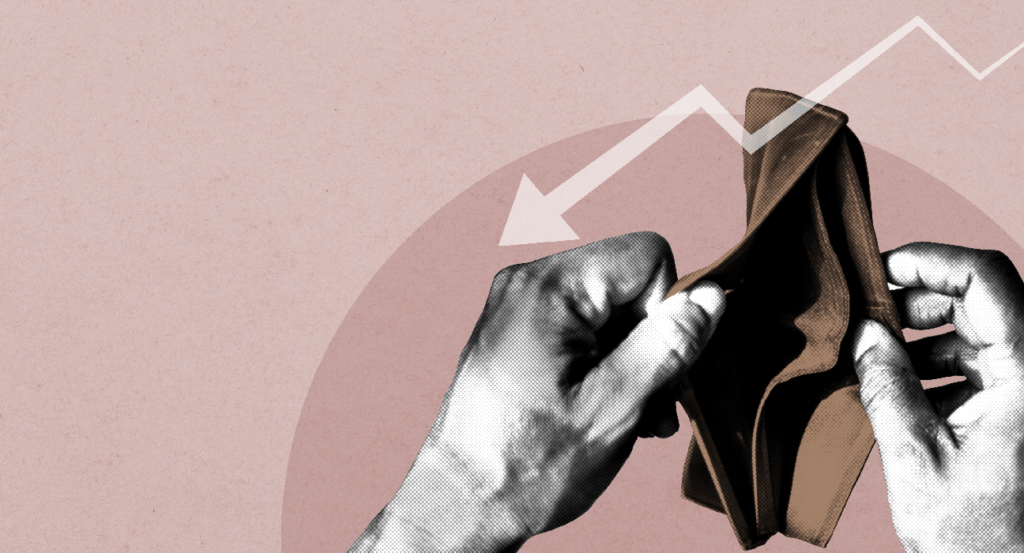All of us are quite sure of the fact that our blood pressure levels would certainly shoot up if this month’s electricity bills shoot up beyond average and high. But did you know that the high levels of inflation that our nation’s economy faces, which is very much a generic issue of concern, can even affect our mental health?
Read: Teaching Financial Literacy for Better Mental Health
Inflation, as we all are well aware, is a term used by economists to point out the decrease in the consumer’s purchasing power, depicting the increase in the prices of goods and services in an economy. High surges in demand for goods and services, decline in the production of the same, increase in public spending, hoarding, high export rates etc., can be some of the primary causes of inflation.
Inflation can adversely affect mental and emotional health as even the necessities witness a surge in their prices under situations of inflation. The consequences that a consumer may face in his financial life due to inflation can drive them to face emotional and mental turmoil. It can render consumers to remain uncertain, i.e., they would turn out to be unsure about what to do next, how to tackle the situation or even how to manage their finances as it’s just the power of the money that got reduced and never the expenditure.
This feeling of uncertainty, coupled with a major chunk of powerlessness in their finance management and hopelessness about their future, can put them in a state of mental turmoil. These emotions have seen a particular spike during the pandemic. Inflation can steal away one’s feeling of security and lead them to develop heightened worry about their future especially as it could put their job security at serious stake.

Moreover, it can lead to increased levels of financial stress which, in today’s world, connects to many other discrepancies that one may face in their life. The very situation wherein an individual finds himself or herself inadequate or even incapable of providing for themselves and their families can be a precursor to developing chronic anxiety, exhaustion, hopelessness, and apprehension about their future.
It can also birth to strained and troubled relationships within families and between partners or spouses. Lack of understanding within families regarding the real root cause of the strains in the relationship can certainly worsen the circumstance. Inflation can render a completely greater degree of emotional turmoil to families run by single parents or by people who are physically disabled and they may witness a depreciation in the living standards. Harvard Business Review recently concluded in one of their findings that the constant stress that people face due to increased expenditures and financial constraints can render the person less productive and less focused on making healthy life choices. “The Impact of Inflation on Mental Health Survey” conducted recently by FinMasters concluded that about 67% of respondents found paying bills as the major source of their stress while heightened apprehensions about affording necessities like food were found in a whopping 86% of the respondents.
Money can’t buy Happiness But it is certainly important in one’s life. That’s why it is important to be financially literate, especially in the present world where losing your financial security can lead to a lot of misfortunes. Therefore, we have created this list of the Top 6 books to sail your piggy bank ship over the raging sea with ease and skill!!
- Budgeting: “The Total Money Makeover” by Dave Ramsey
- Debt: “Debt-Free Forever: Take Control of Your Money and Your Life” by Gail Vaz-Oxlade
- Investing: “The Intelligent Investor” by Benjamin Graham
- Insurance: “Risk Savvy: How to Make Good Decisions” by Gerd Gigerenzer
- Fiction on Money
- “The Great Gatsby” by F. Scott Fitzgerald
- “The Millionaire Next Door” by Thomas J. Stanley and William D. Danko
How to Cope?
It is impossible to deny that inflation can hurt people’s standards of living and present difficulties for many, particularly when it happens quickly. There are a few pointers that could lessen the harm inflation does to you.
1. Budget, Budget, Budget
Making a budget is the first and maybe most obvious advice. Because of the high inflation rate, consider changing your budget every quarter. Making a budget has several benefits, not the least of which is that it can improve your mental health in addition to helping you save money. The budget will give one insight into the circumstances and a roadmap for what to do next.
2. Alternate Transportation
With petrol prices so high, an alternative form of transportation would be to walk, bike or use the bus whenever possible. If you live somewhere where you have to drive to get anywhere, think about packing ahead of time to save repeat trips and consider carpooling with nearby residents.
3. Seek Professional Or Personal Help
To effectively handle the hopelessness, misery, and worry brought on by the uncertainties of these inflationary times, one can try consulting a therapist. Maintaining positive relationships with friends and family, getting adequate sleep, and participating in enjoyable activities are all crucial for mental wellness.
4. Set Goals and Be well Informed
Establishing financial objectives and creating a strategy to reach them can also give you the self-assurance to handle your money through economic upheaval. Attempting to be current on inflation and the economy might help people understand how changes in the economy may affect mental health issues. Making proactive efforts to safeguard mental health can be aided by having an understanding of how variables like expenditure, taxation, unemployment, and wages affect mental well-being.













Leave feedback about this